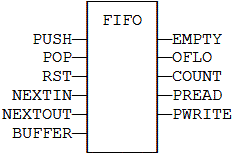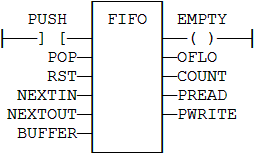FIFO
Function block - Manages a first in/first out queue.
Inputs
|
Input |
Data type |
Description |
|
PUSH |
BOOL |
Push a new value (on rising edge). |
|
POP |
BOOL |
Pop a new value (on rising edge). |
|
RST |
BOOL |
Reset the list. |
|
NEXTIN |
ANY |
Value to be pushed. |
|
NEXTOUT |
ANY |
Value of the oldest pushed value - updated after call! |
|
BUFFER |
ANY |
Array for storing values. |
Outputs
|
Output |
Data type |
Description |
|
EMPTY |
BOOL |
TRUE if the list is empty. |
|
OFLO |
BOOL |
TRUE if overflow on a PUSH command. |
|
COUNT |
DINT |
Number of values in the list. |
|
PREAD |
DINT |
Index in the buffer of the oldest pushed value. |
|
PWRITE |
DINT |
Index in the buffer of the next push position. |
Remarks
NEXTIN, NEXTOUT and BUFFER must have the same data type and cannot be STRING.
The NEXTOUT argument specifies a variable that is filled with the oldest push value after the block is called.
Values are stored in the BUFFER array. Data is arranged as a roll over buffer and is never shifted or reset. Only read and write pointers and pushed values are updated. The maximum size of the list is the dimension of the array.
The first time the block is called, it remembers on which array it should work. If you call later the same instance with another BUFFER input, the call is considered as invalid and makes nothing. Outputs reports an empty list in this case.
In LD language, input rung is the PUSH input. The output rung is the EMPTY output.
ST Language
MyFIFO is a declared instance of FIFO function block.
SMyFIFO (PUSH, POP, RST, NEXTIN, NEXTOUT, BUFFER);
EMPTY := MyFIFO.EMPTY;
OFLO := MyFIFO.OFLO;
COUNT := MyFIFO.COUNT;
PREAD := MyFIFO.PREAD;
PWRITE := MyFIFO.PWRITE;
FBD Language

LD Language

|
|
Created with the Personal Edition of HelpNDoc: Protect Your Confidential PDFs with These Simple Security Measures

